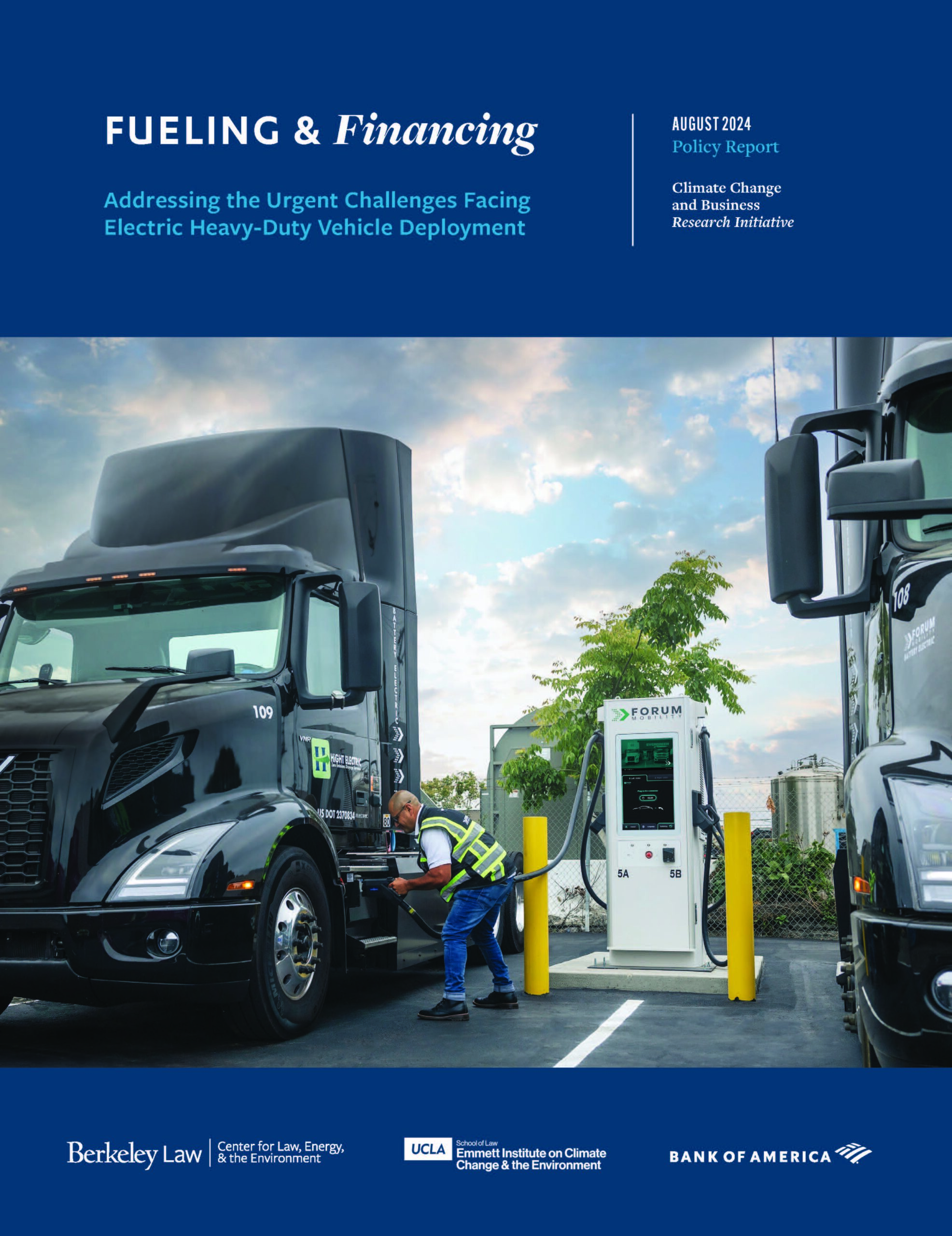August 2024 
Heavy duty vehicles, such as large semi-trucks and buses, disproportionately contribute to harmful air pollution, particularly in low-income and disadvantaged communities. They also emit significant greenhouse gases, exacerbating climate change. Fortunately, zero-emission electric versions of these vehicles are on the road today and increasingly available. However, the infrastructure required to support these vehicles is immense. The California Energy Commission estimates that by 2030, the state will need 114,500 chargers to support the anticipated 155,000 medium- and heavy-duty electric trucks and buses.
In addition, vehicle purchases will require financial assistance in many instances. The current upfront cost of battery-powered vehicles is higher than their fossil-fueled counterparts, with an upfront cost premium estimated by some analysts to be 43% for class 6-7 trucks, 69% for non-tractor class 8 trucks, 86% for short-haul tractors, and 203% for long-haul tractors. While many observers expect the gap to disappear and battery-powered vehicles to become cheaper on a total cost of ownership basis by the next decade, many purchasers (particularly smaller fleets) will need significant financial assistance to make these purchases.
To address these dual needs of infrastructure and financing, UC Berkeley Law’s Center for Law, Energy and the Environment (CLEE) and the UCLA Law Emmett Institute on Climate Change and the Environment convened experts and stakeholders to help identify the most pressing barriers both to deploying more charging infrastructure and to unlocking more private financing for both electric vehicles and the infrastructure on which they rely, as well as the solutions to overcome those barriers.
Our new report Fueling & Financing: Addressing the Urgent Challenges Facing Electric Heavy-Duty Vehicle Deployment, based on literature review and two separate half-day workshops with a select group of stakeholders, offers policy recommendations for state agencies. Some key recommendations include:
- The Legislature and California Public Utilities Commission could require utilities to improve energization timelines and authorize utilities to advance expenditures to fund grid upgrades for heavy-duty charging infrastructure sooner
- The Governor could create an executive level “charging working group” or “czar” with the authority to ensure coordination and hold accountable state agencies responsible for the deployment of charging infrastructure to support the heavy-duty vehicle sector
- The California Legislature and Air Resources Board could modify Hybrid and Zero-Emission Truck and Bus Voucher Incentive Project (HVIP) funding to ensure more targeted uptake by fleets more readily able to electrify
- The California Infrastructure and Economic Development Bank (IBank) and Air Resources Board could facilitate private-sector lending for heavy-duty electric vehicles and associated infrastructure
- The California IBank or Legislature could expand and expedite loan loss reserve programs to offset investor and insurer concerns about the residual value of used vehicles
The solutions outlined in this report can offer a path for state policymakers to ensure that the decarbonization of heavy-duty vehicles is feasible and rapid, while addressing urgent equity, climate, and economic concerns.
This report is the latest release in the Climate Change & Business Research Initiative, a collaboration between CLEE and UCLA Law’s Emmett Institute on Climate Change & the Environment. Since 2009, initiative leaders have published a series of policy papers and organized multiple events on how climate change will create opportunities for specific sectors of the business community and how policymakers can facilitate those opportunities.
Access the full report here: Fueling & Financing: Addressing the Urgent Challenges Facing Electric Heavy-Duty Vehicle Deployment
To learn more, view our webinar on the report that was held on Thursday, September 19th at 10am PT, which featured a keynote by Dr. Steven Cliff, Executive Officer at the California Air Resources Board, followed by a panel discussion with Niki Okuk, Deputy Director of Trucks and Off-Road at CALSTART and Jacqueline Torres, Vice President of Finance, Forum Mobility.
Contact Shruti Sarode or Ethan Elkind for more information.